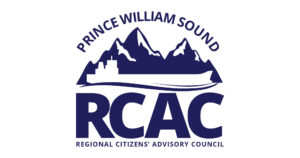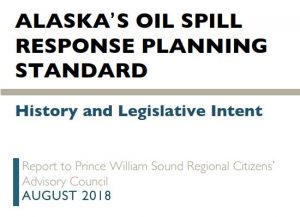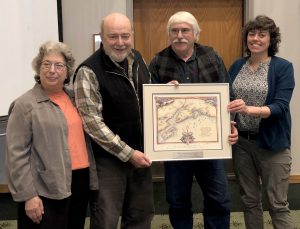The Prince William Sound Regional Citizens’ Advisory Council passed Resolution 23-01 on September 21, 2023: Urging the United States Coast Guard to Homeport a Sentinel-Class Cutter, Also Known as the Fast Response Cutter, in Port Valdez
WHEREAS, the Prince William Sound Regional Citizens’ Advisory Council was established after the 1989 Exxon Valdez oil spill and is mandated by Congress in the Oil Pollution Act of 1990 to promote the environmentally safe transportation of crude oil from the Valdez Marine Terminal through Prince William Sound and the Gulf of Alaska; and
WHEREAS, the Trans Alaska Pipeline System is the lifeblood of the Alaska economy, with its terminal in Port Valdez seen as critical to both national security and energy infrastructure, and understood to be a target for terrorism; and
WHEREAS, the volume of oil, which accounts for roughly 3-4% of the nation’s supply, is transported through the environmentally sensitive and pristine Prince William Sound, necessitating a high level of care to help protect Alaska, its residents, communities, economies, and environments; and
WHEREAS, Port Valdez is a designated United States Maritime Administration Alternate Strategic Port, as a means to ensure readiness in support of force deployment during contingencies and other national defense emergencies; and
WHEREAS, there were no on-water United States Coast Guard assets available in Port Valdez after the terrorist attacks of September 11, 2001, requiring the United States Coast Guard Cutter (USCGC) ANACAPA to be relocated to Port Valdez from Petersburg, Alaska, in recognition of the need for a cutter to help protect the Trans Alaska Pipeline System, including the Valdez Marine Terminal and its associated shipping infrastructure in Port Valdez; and
WHEREAS, starting with the USCGC LONG ISLAND, an Island-Class cutter has been homeported in Port Valdez since 2003; and
WHEREAS, the United States Coast Guard currently has no plans to replace the USCGC LIBERTY currently stationed in Port Valdez that is at the end of its service life; and
WHEREAS, threats to national security and critical energy infrastructure, such as the Good Friday Earthquake of 1964 and the terrorist attacks that occurred on September 11, 2001, emphasize the need for a timely and effective response from the coast in Port Valdez; and
WHEREAS, after the departure of the USCGC LIBERTY, the nearest cutters will be in Cordova at more than two hours away, Seward at five hours away, and Kodiak at 12 hours away; and
WHEREAS, the presence of a USCGC stationed in Port Valdez is a recognized and valued asset in enhancing marine safety and the safe transportation of crude oil in Prince William Sound, both in preventing and responding to oil spills; and
WHEREAS, in addition to support in prevention of oil spills and directing the Federal response to a spill, a cutter can serve in multiple operational roles including law enforcement, search and rescue, and fisheries enforcement; and
WHEREAS, recent conflicts within the Prince William Sound Traffic Lanes of the Valdez Narrows, with fishing and recreational vessels encroaching on the security zones in place to protect crude oil tankers, create a navigational safety risk and highlight the need for a continued presence by the United States Coast Guard to enforce the security zones that were permanently established after September 11, 2001, under 33 CFR 165.1710.
NOW, THEREFORE BE IT RESOLVED, that the Prince William Sound Regional Citizens’ Advisory Council urges the United States Coast Guard to homeport a Sentinel-Class cutter, also known as the Fast Response cutter, in Port Valdez; and
BE IT FURTHER RESOLVED, that the Prince William Sound Regional Citizens’ Advisory Council supports efforts by the City of Valdez to secure the homeporting of a Sentinel-Class cutter in Port Valdez.
PASSED AND APPROVED by the Prince William Sound Regional Citizens’ Advisory Council on this 21 day of September 2023.



